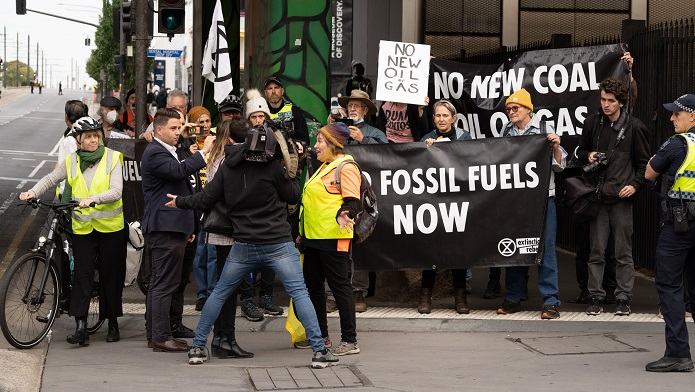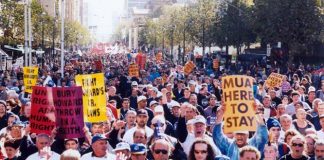Adelaide (stolen Kaurna land) lived up to its Radelaide nickname last week, with fantastic actions against two planet-threatening confabs—on fossil fuels and war—within a few hundred metres of each other.
Betraying everything it supposedly stands for, South Australia’s Labor government responded with hasty legal changes to crack down on protest, egged on by talkback radio and the Liberal opposition.
Extinction Rebellion (XR) South Australia organised a week of protest around the conference held by the Australian Petroleum Production & Exploration Association (APPEA).
This started with displays of banners from XR and supporting organisations along nearly a kilometre of the main road from the airport, “unwelcoming” conference delegates and calling for an end to new oil and gas projects.
The week included several more creative and “safe” actions like this, including Butoh-inspired theatre and a rave outside the conference.
Rebels donned their bling for XR’s Climate Criminal awards, ably hosted by “Melanie Methane” and “Craig Carbon”. Wooden spoon awards were handed out to business-suited actors caricaturing Santos, Woodside and other deserving recipients.
Dramatic
But the cutting edge was provided by the more dramatic direct actions. Twelve protesters were arrested, with some putting their bodies on the line to block cars entering the conference centre and scientists touring the state’s Drill Core Reference Library. Paint was sprayed over the front of Santos headquarters.
On the Wednesday at SkyCity Casino, No Nuclear Subs SA organised noisy chanting and placards to greet former Liberal Defence Minister Christopher Pyne and others attending an American Chamber of Commerce forum on ways to profit from AUKUS. Current Defence Minister Richard Marles was also a speaker.
Having run the gauntlet outside, attendees faced disruption inside, with protesters who infiltrated the conference room hanging banners and spruiking peace. Some of the protesters were interstate visitors in Adelaide for the XR actions, rightly drawing the links between issues with slogans such as “Climate collapse is the only security threat”.
The action that literally stopped the city saw 69-year-old Mémé Thorne abseil from a bridge outside the conference, surrounded by supporters chanting and displaying banners. With the rope anchored on the far side of the upper roadway, she blocked traffic over and under the bridge during the morning peak.
A fire appliance was brought in to remove Thorne. The fire service union put on a fine display for May Day and has supported past climate demos, so there may be scope to get them to green ban the breaking of protests in future.
Throughout the week the state Labor government threw its weight behind APPEA. Energy minister Tom Koutsantonis gave a fawning welcome address, thanking them for their “largesse” and saying, “The South Australian government is at your disposal.”
The government followed through on these words after Thorne’s brave protest. They rushed legislation through the lower house to increase the maximum penalty for “obstruction of a public place” from a $750 fine to $50,000 plus jail for up to three months. The Liberals claimed credit for drafting the new law.
Contrary to the government’s claims, the amendments do not simply increase the penalty. The scope of included behaviour is widened. There’s a new provision for offenders to pay the costs of emergency services, on top of fines and jail time. The clear aim is to frighten potential protesters off any effective direct action.
Integral
Many organisations were quick to speak up against the bill and campaign to block it in the upper house. Speaking for SA Unions Dale Beasley said, “Our rights to assembly and protest exist so that people can disrupt injustice—disruption is the point.
“Those rights must be upheld. Peaceful but disruptive protests and demonstrations have been integral in achieving so much of what we now take for granted in our society, like the right to vote and elect our leaders.”
Referring to similar laws passed recently in other states, Amnesty stated, “These harsh penalties on those protesting peacefully are part of an unacceptable trend in Australia which has seen the right to protest stymied in recent years.”
XR held a “Good Riddance Climate Criminals” rally at Parliament House on the last conference day. This was peaceful, noisy and colourful, with a sprinkling of attendees from other organisations including three Greens MPs.
XR hero Violet Coco, famous for being jailed under NSW’s new anti-protest laws, challenged the pervasive notion of state capture in her speech. As she said, the crackdown on people speaking up for the planet is exactly what we should expect from a state founded on dispossession and genocide of First Nations people.
It was disappointing that most of the people at the rally were XR faithful—several from interstate—who had been at other actions during the week. The climate strikes a few years back brought thousands onto the streets, and the movement needs to find ways to bring similar numbers back into action.
It’s the combination of a dynamic mass movement and disruptive direct action—and crucially, involvement by unions at the workplace level—that can restore the right to protest and sustain the power to defeat both climate and war criminals.
On Friday 26 May, Amnesty and a host of other organisations are backing a rally to protect the right to protest so radical protest can thrive in Radelaide.
By Robert Stainsby
Help pay the court costs and fines for arrested APPEA XR protesters by donating to this online fundraiser.






